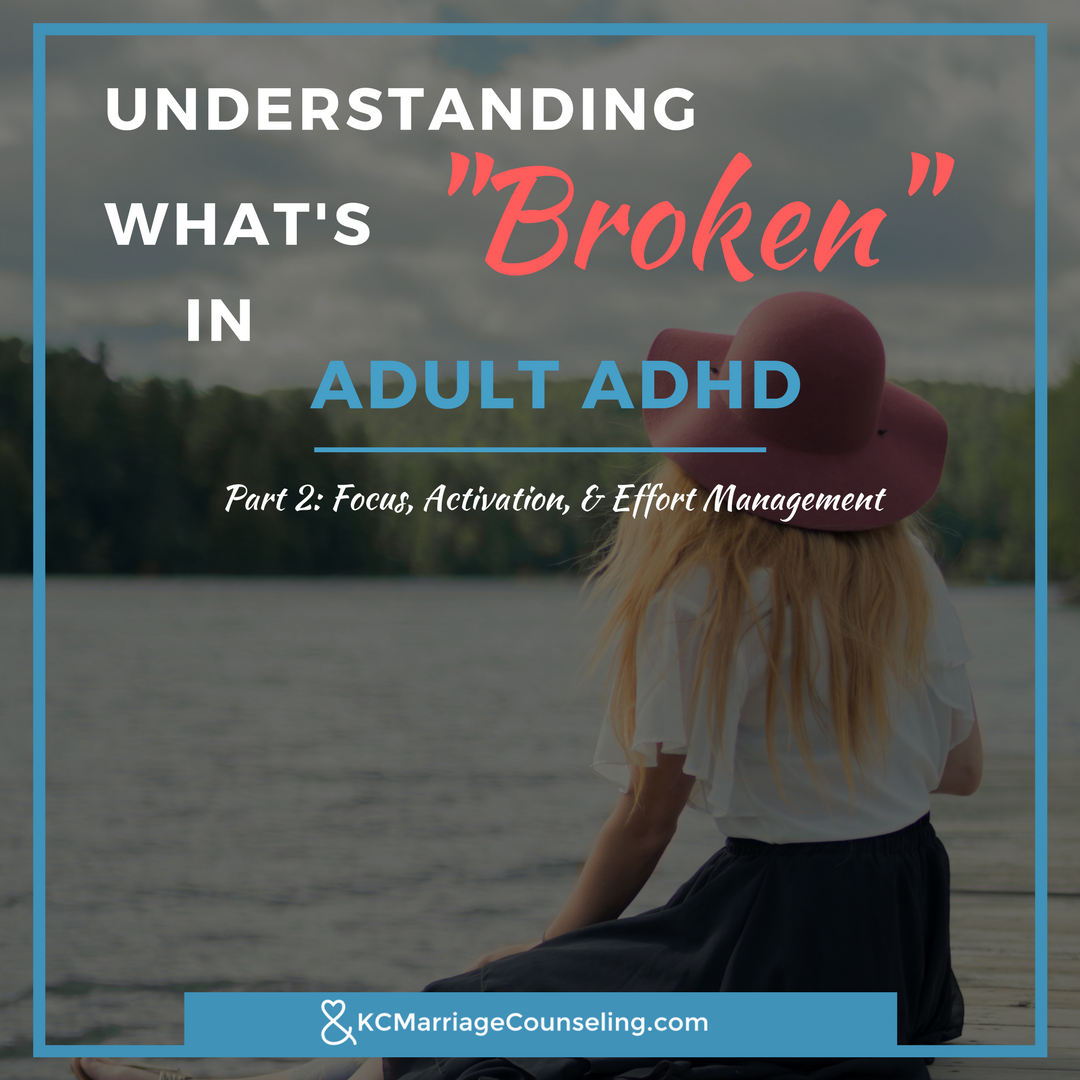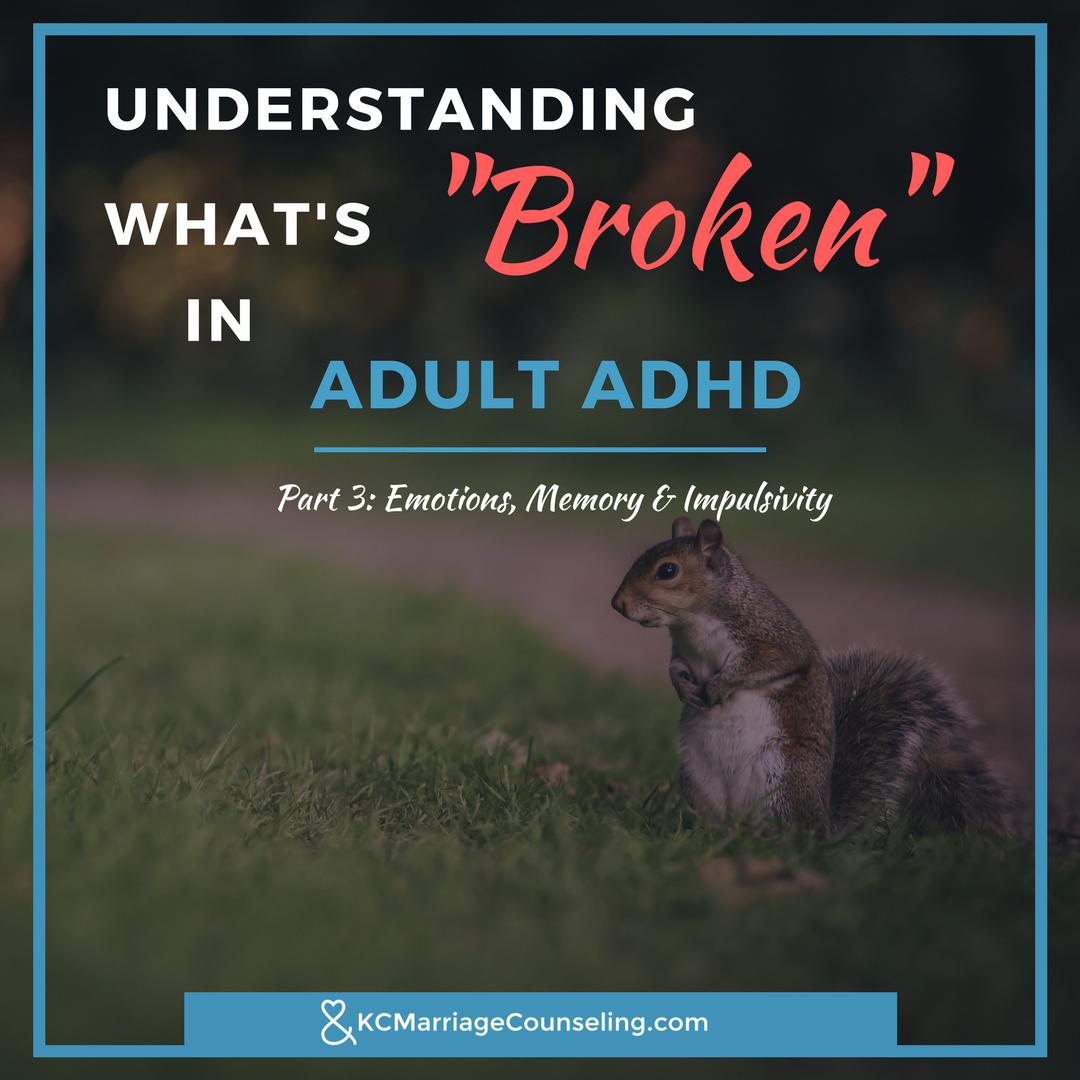Have you ever thought that the name of “Attention Deficit Disorder” or “Attention Deficit-Hyperactivity Disorder” - didn’t really describe you, so you couldn’t possibly have ADHD, right? There are a number of clinicians and researchers who think that ADHD is not actually a very good name for this cluster of symptoms and problems.
Dr. Russell Barkley says that ADHD is not a very good name for it, but it might be called “Intention Deficit Disorder” or you could think of it as a disorder of Executive Functions not really functioning very well.
Today, I am continuing the series on helping you to understand Executive Functions, how they are related to ADHD/ADD and a few tips for each deficit. For the first part click here.
To Review, the 6 Executive Functions impaired in ADHD
- Task Management (Activation) - Prioritizing, organizing and initiating activity
- Attention Management (Focus) - Focusing, sustaining, shifting attention to different tasks
- Effort Management - Alertness, sustaining effort, managing energy, and processing speed
- Emotion Management - Managing frustration, modulating and regulating emotions
- Information Management (Memory) - Using working memory and accessing recall
- Action Management - Monitoring, inhibiting, and self-regulating action
1. Task Management (Activation)
Prioritizing, Organizing, and Initiation Activity
What this looks like:
- Difficulty getting started
- Procrastinating
- Knowing what needs to get done, but just can’t make yourself do it
- Problems with prioritizing and knowing where to start
- Needs pressure, fear of consequences, or deadlines in order to get stuff done
Pros: Ability to handle high-pressure or intense situations. You feel like your brain “wakes up” when others would be freaking out - Great for EMTs, Emergency Room workers, Law Enforcement, etc (and many other occupations that have a high-pressure component). You also might be more flexible and more able to handle and like spontaneity.
Cons: Can appear lazy, because while in your head you are really freaking out about what you want to do and just can’t get started, others outside of your head can’t see that - They can’t see that you are frozen and stuck. Also, the inability to get started, especially on boring or uninteresting tasks, can lead to disorganization, clutter, missing important deadlines, lost items, etc.
Example Strategies: get help setting priorities, get outside help breaking things down into smaller parts, use or create external deadlines and accountability systems, use external rewards and reward often, give yourself permission to take mini-first steps.
2. Attention Management (Focus)
Focusing, Sustaining, and Shifting Attention between Tasks
What this looks like:
- Easily bored
- Requiring genuine interest in something to sustain focus
- Easily distracted - Squirrel!
- Difficulty figuring out what to pay attention to - everything looks equally important or emergent
- Hyperfocus
- Unable to switch tasks when you need to
- Being late to places because you finally got started and now don’t want to stop
Pros: Extremely motivated and supportive when interested in the task or subject. Able to notice things that other people don’t see. A big picture thinker and see-er
Cons: Can appear selfish or self-centered because it looks to others that you are only interested and willing to do what you are interested in doing and other people interpret that as they are not important to you. Unable to do important tasks because they are boring (taxes, cleaning, running errands, filing papers, etc). Lose time due to hyperfocus. Ruminate on negative event sea emotions due to hyperfocus and unable to shift attention to more helpful thoughts.
Example Strategies: Set timers to help you break out of hyperfocus, set timers for short periods of time that you have to focus - 10 minutes to focus on this task, then get a break, etc. Eat protein. Exercise and get blood flowing to your brain. Eat some healthy sugar (fruit or carbohydrate) to energize your brain. Focus for a short time and take frequent breaks. Use a body double
3. Effort Management
Alertness, Sustaining Effort, Managing Energy, and Processing Speed
What it looks like:
- Extreme fatigue, especially when you are required to sit, be quiet and pay attention
- Trouble maintaining alertness, even falling asleep when activities are boring or uninteresting, such as paying bills or reading
- Requires steady stimulation or input, whether physical or mental to stay alert
- Slower processing speed - can take a long time to read or write, or process verbal instructions or information
- Can also be over-activated - where mind or body has a hard time slowing down enough to take in information and processing it
Pros: Because you need to constantly monitor your alertness and energy level, you could have an improved sense of self-awareness. Sometimes a slow processing speed can help you to slow down and think before acting on information.
Cons: Inability to sustain effort can look lazy to others. Slow processing speed can be interpreted as you are stupid or less intelligent (which is not true), and energetic behavior or speech can be off-putting to others.
Example Strategies: Exercise to get blood flowing - raise heart rate for 10 minutes, or do push ups, etc. Use Fidgets. Make sure you are getting good sleep. Give yourself frequent, physical breaks. Use frequent, small rewards. Break things down into small, even mini tasks.
There are many, many other strategies for each of these problems - Google is your friend (or worst enemy!) :-)
If you'd like more information now, I suggest "Parenting ADHD Now" by Elaine Taylor-Klaus & Diane Demptster of Impact ADHD. (Where I found these great explanations and list of executive functions above) Even though the books says it is about parenting with ADHD, I find that the explanations in this books are very, very good, and many of the tips for kids with ADHD are simple and uncomplicated and work AWESOME for adults with ADHD.
What would you add to each of the above 3 Executive Function Deficits? Do you related to any of these? Do any of these get in your way? Do any of these deficits cause problems in your relationships or marriage?
I think it is so very important to understand what is “broken” with ADHD for several reasons:
1. You are not alone, stupid, lazy, or “messed up”. Your brain does not work in the same way that the brains of people without ADHD work. Parts of your brain might never work how you want it to, but the world needs to you function effectively and responsibly. So, instead of failing to get your brain to behave, over and over, understand what is not working and figure out ways around that - or work with those parts.
2. What you understand the specific difficulties of ADHD that are tripping you up the most, you can focus on strategies to help you with those specific things. You don’t have to “fix” everything wrong with you regarding ADHD - start with one thing and go from there.
If you would like to learn more about Executive Functions and how they might be a problem for you, would like support or accountability to help you make changes, or are feeling just plain lost and hopeless that you’ll never be able to change, contact me. There is help for you! Individual or group counseling might be just the thing you need - you aren’t broken! You aren’t messed up. You just need some help - which is ok. It is ok to need help and support.
If you are wanting help and/or support with your ADHD, managing Executive Functions or dealing with Time blindness, and are in the Kansas City area, I suggest joining the Adult ADHD Treatment group - a weekly meeting of adults with ADHD to help you finally get (stuff) done.
Also, if you'd like the rest of the series and upcoming blog posts delivered directly to your email inbox, subscribe below!
More posts you might find interesting...














Quick tip for Adults with ADHD - Use a Did It list when you are struggling with your To Do list, feeling overwhelmed, or stuck.